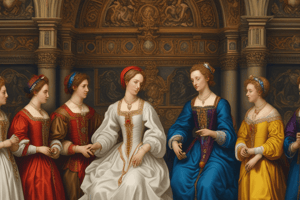Podcast
Questions and Answers
What language emerged as the 'courtly language' during the Renaissance in Florence?
What language emerged as the 'courtly language' during the Renaissance in Florence?
- Latin
- Toscan (correct)
- Italian
- Spanish
Which family ruled Florence and became known for patronizing the arts?
Which family ruled Florence and became known for patronizing the arts?
- Medici family (correct)
- Gonzaga family
- Borgia family
- Sforza family
What event in 1378 represented a revolt of the poor against the economic circumstance in Florence?
What event in 1378 represented a revolt of the poor against the economic circumstance in Florence?
- Ciampi revolt (correct)
- Pazzi Conspiracy
- Medici Uprising
- Renaissance Rebellion
Which individual is recognized as the 'father of humanism' for rediscovering classical learning?
Which individual is recognized as the 'father of humanism' for rediscovering classical learning?
In what capacity did the guilds influence government in Florence?
In what capacity did the guilds influence government in Florence?
What was a significant consequence of the Pazzi conspiracy against Lorenzo de Medici?
What was a significant consequence of the Pazzi conspiracy against Lorenzo de Medici?
What role did Florence play in international banking during the Renaissance?
What role did Florence play in international banking during the Renaissance?
What does humanism emphasize in the context of Renaissance thought?
What does humanism emphasize in the context of Renaissance thought?
Flashcards
Italian Renaissance
Italian Renaissance
The period in European history marked by a renewed interest in classical learning, art, and culture. The focus shifted from religious dogma to human potential and individual expression.
Medici Family
Medici Family
A wealthy and powerful Italian family that dominated Florence during the Renaissance. They were known for their patronage of the arts, their political influence, and their banking empire.
Ciampi Revolt
Ciampi Revolt
A rebellion in Florence in 1378 sparked by economic hardships and tensions between the wealthy elite and the working class. It challenged the city's established power structures.
Signoria
Signoria
Signup and view all the flashcards
Florence's Conquest of Pisa
Florence's Conquest of Pisa
Signup and view all the flashcards
Pazzi Conspiracy
Pazzi Conspiracy
Signup and view all the flashcards
Humanism
Humanism
Signup and view all the flashcards
Petrarch
Petrarch
Signup and view all the flashcards
Study Notes
Florence as a Renaissance City
- Florence, Italy, became a major trade and manufacturing center.
- Ruled by the Medici family, who patronized the arts.
- Signoria, a council, approved decisions and handled foreign affairs.
- The city had various guilds, including cloth merchants, with significant influence.
- Florence's economy relied heavily on banking and commerce.
- The city's wealth fostered artistic innovation and cultural flourishing.
- The rediscovery of classical learning and texts, like those of ancient Romans, influenced the development of Humanism.
- Humanism emphasizes human dignity and potential.
- The rediscovery of classical texts stimulated intellectual curiosity.
- Literacy rates were relatively high, and schools and universities existed.
- The city was a center of international banking.
The Medici Family
- The Medici were a powerful banking family in Florence.
- They were involved in various political positions.
- Their wealth helped to shape Florence's political and cultural landscape.
- Lorenzo de Medici (il Magnifico) played a key role during the Italian Renaissance.
- The Medici family controlled public offices and used public funds for their own purposes.
- They used their wealth to influence and control rival political families.
- Conflicts occurred with rival families, like the Pazzi conspiracy that attempted to assassinate Lorenzo de' Medici.
Political and Social Tensions in Florence
- The Pazzi conspiracy, an attempt to assassinate Lorenzo de' Medici, revealed inner conflicts within Florentine society.
- Economic hardships led to uprisings, like the Ciampi revolt.
- Tensions existed between wealthy elites and the working class.
- Public offices were sometimes controlled, or influenced, by wealthy families.
Humanism
- Humanism emphasized human potential and dignity during the Renaissance, as opposed to scholasticism.
- Scholars studied ancient Greek and Roman texts.
- The study of classical works guided intellectual pursuits.
- Petrarch's rediscovery and celebration of classical Latin texts contributed to Humanism.
- Florence's culture embraced secular cultural values.
Studying That Suits You
Use AI to generate personalized quizzes and flashcards to suit your learning preferences.




